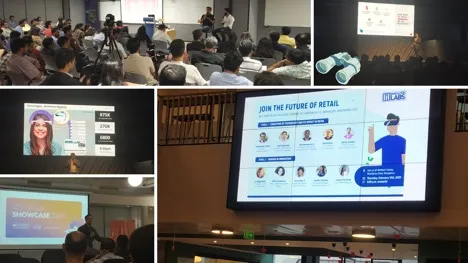Corporate-startup programmes reveal how partnerships are key to success
Some observations from recent corporate-startup gatherings, including the Cisco Launchpad, Target Demo Day, NetApp Excellator, Brigade REAP Cohort 7 launch, and during Lowe’s Innovation Labs roadshow.
Listening to Microsoft CEO’s Satya Nadella and Co-founder Amod Malviya at the recent Microsoft Future Decoded summit in Bengaluru made me reflect deeper about the startup and corporate engagement dynamics. The thought-provoking event had other insights as well, including those on developer productivity, the need to observe more real-world problems, and leveraging cutting-edge technologies around cloud, edge, and data sciences for success. There are also some notable announcements like Microsoft’s 100X100X100 programme for Indian B2B SaaS startups.

In this article I would like to share some of my experiences and key takeaways from corporate leaders and cohort startup founders, on how best one could partner for success.
You are building a business, not just a technology solution
While it may seem like corporations are more interested in a startup’s IP or core technologies, they do realise that a startup’s success can also be attributed to managing teams, ability to tweak their business model, being financially prudent, having good communication skills, and being able tap into opportunities in a timely manner. Startups and corporate houses will do well to discuss their expectations well in advance.
Startup’s innovation speed + corporate’s distribution network
Most top founding teams are lean, hardworking, and are able to not just build but validate their solutions quickly. With most corporations having access to a massive customer base, with whom they have already established trust and credibility, it makes it much easier for startups to sell with corporate partners. I remember a startup founder sharing how by being part of Oracle’s OpenWorld event in Delhi as a cohort startup, he was able to land some quality customers.
Mentorship from corporate leaders, guidance from startup peers
Most popular corporate programmes manage to create an atmosphere where not just the current cohort founders interact with each other but also past founders who are actively engaging. I am reminded of our time as an Axilor cohort company and the kind of value the peer network adds. Corporate and domain experts bring in another angle of mentorship and advice, which they mostly gather through their years of hands-on experience.
Increased funding chances through better branding opportunities
I recollect a healthcare founder telling me that engaging investors today is like dating: you need to be able to catch their eye, but not seem to be desperate in your efforts.
Also, by being associated with a renowned corporate brand, who may also be their customer, a startup’s proposition suddenly becomes much more lucrative to the investor’s community.

Founder’s vision and data nodes are second to none
Corporate programme leaders would do well to take the time and effort to understand where a founder’s vision and opportunity interest comes from. With that as the starting point, it's easier for both parties to tweak a product offering further and to make it commercially successful. While certain studies, podcasts, and talks may have some substance, it should not be used as the thumb rule to assess all startups.
Corporates and program managers can learn from each other too
Today, with plenty of conferences and the proximity of corporate programme locations, many of these leaders get to interact with each other and explore synergies, best practices, etc. Erik Grab, who leads Innovation & Sustainable Development at Michelin, once shared, “Just as today single corporations engage multiple startups in their programme, soon we would also have single startups also simultaneously engaging with multiple corporations.” This is something he recommends startups to do and corporates to be open about.
Talks by leaders can inspire and elevate one’s will power
It may sound cliche, but many startup and corporate professionals alike, do seem more energised after they hear from inspirational leaders, be in from domains such as sports, creative streams or business. I remember networking sessions post talks by those like Anil Kumble, Sunil Chhetri, Deepika Padukone, Jaggi Vasudev (Sadhguru), Prime Minister Narendra Modi, Ratan Tata, Rajan Anandan, Shradha Sharma, Vijay Shekhar Sharma, or Naveen Tiwari were all high energy.
Take a leap of faith, but find ways to learn and measure all outcomes
After all, entrepreneurship is about a leap of faith. As they say, those that cannot be defensible include working hard, being smarter, a market’s readiness and data. Hence both startups and corporate partners need to find a method to keep improving by measuring all their efforts and the kind of outcomes they lead to. Also, today participation at an event, coworking productivity, community contributions, business calls, and meetings can all be assessed and made more productive.
While each country and ecosystem is unique, one could very well assimilate best practices from other global startup hubs. For instance, in Barcelona, I was impressed by the Mobile World Capital Barcelona’s programme (those behind Mobile World Congress), mVenturesBcn, and the international accelerator NUMA, which were able to seamlessly work together to ensure their startup needs and objectives are all aligned.
It would be great to hear your thoughts on startup corporate programme experiences in the comments below.
(Edited by Evelyn Ratnakumar)
(Disclaimer: The views and opinions expressed in this article are those of the author and do not necessarily reflect the views of YourStory.)








